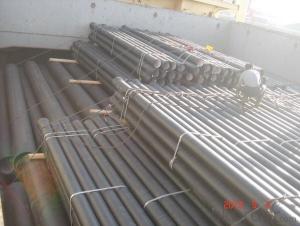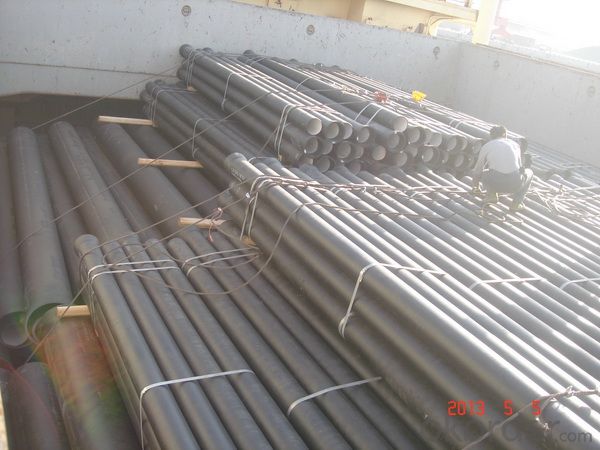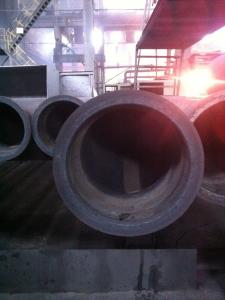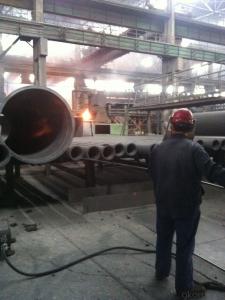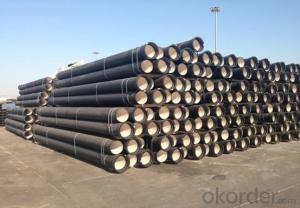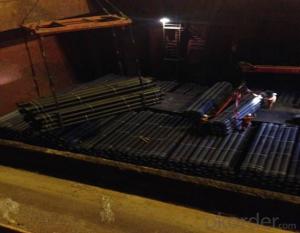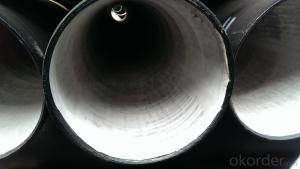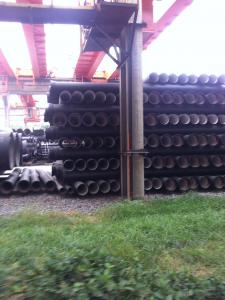DUCTILE IRON PIPES AND PIPE FITTINGS K9 CLASS DN1800
- Loading Port:
- Tianjin
- Payment Terms:
- TT OR LC
- Min Order Qty:
- 22 pc
- Supply Capability:
- 3000 pc/month
OKorder Service Pledge
OKorder Financial Service
You Might Also Like
Material : Ductile Cast Iron
Size Range : DN 80mm to DN 2000mm
Unit Effective Length : 6m or 5.7m
Manufacture Standard: ISO 2531:1998/ EN 545:2006/EN 598:2007
Annual capacity : 200,000 tons
Coating Exterior: Zinc 130g/m2 according to ISO 8179-1 and bitumen coating 70 microns.
Cement Interior: Portland Cement/ High Alumina Cement/ Sulphate Resisting Cement Lining according to ISO 4179
Special requirements on external coating and internal lining can be applied
We also provide accessories such as SBR/EPDM rubber gaskets, lubricant paste, pipe caps, PE sleeves, etc.
Additional Parts:
Each pipe is strictly inspected according to related standard to ensure permanently high performance.
Easy Installation at site and service free for life
Long Service Lifespan
Quotation will arrive you within 24hours once we get your inquiry.
We guarantee offering you a competitive price.
A copy of original inspection reports of pipes will be offered after shipment.
Photos of loading process will be sent to the customer after shipment effect.
We will follow-up the delivery progress after shipment effect and update to the customer on weekly basis.
- Q: Can ductile iron pipes be used for water distribution networks?
- Water distribution networks can utilize ductile iron pipes. Ductile iron, a type of cast iron known for its strength and flexibility, is well-suited for a variety of applications, including water distribution systems. Due to their durability, resistance to corrosion, and long lifespan, ductile iron pipes have been widely used in water supply networks. These pipes are capable of withstanding high pressure and are resistant to external loads and ground movement, making them an ideal choice for underground installations. Additionally, ductile iron pipes are commonly used for transporting safe drinking water as they are non-toxic and do not contaminate the water supply. Moreover, ductile iron pipes possess excellent hydraulic properties, ensuring efficient water flow and minimizing friction losses. Their smooth interior surface prevents the accumulation of deposits, reducing the risk of clogs and maintaining a consistent water flow. In summary, ductile iron pipes offer a reliable and effective solution for water distribution networks, guaranteeing the safe and efficient transportation of water to communities and industries.
- Q: How are ductile iron pipes protected against internal scaling or buildup?
- Ductile iron pipes are protected against internal scaling or buildup through various methods. One of the most common methods is the application of cement mortar lining on the inner surface of the pipes. This lining acts as a protective barrier, preventing the formation of scale or buildup and ensuring a smooth flow of water or other fluids. Additionally, the pipes can be coated with a layer of polyethylene or other suitable materials to provide an extra level of protection against scaling or buildup. This coating acts as a barrier between the water and the iron surface, reducing the chances of corrosion or scale formation. Regular maintenance and cleaning are also crucial in preventing internal scaling or buildup in ductile iron pipes. Flushing the pipes with high-pressure water or using chemical treatments can help remove any accumulated scale or debris, ensuring the pipes remain clean and functional. Furthermore, proper water treatment is important to minimize the risk of scaling or buildup. Implementing appropriate water treatment processes, such as pH adjustment or the use of corrosion inhibitors, can help maintain the quality of the water and prevent the formation of scale or buildup inside the pipes. In conclusion, ductile iron pipes are protected against internal scaling or buildup through various measures, including cement mortar lining, pipe coating, regular maintenance, cleaning, and proper water treatment. These measures ensure the longevity and efficiency of the pipes, minimizing the chances of clogging or reduced flow capacity.
- Q: Can ductile iron pipes be used for trenchless installation methods?
- Yes, ductile iron pipes can be used for trenchless installation methods. Trenchless installation methods, such as horizontal directional drilling or pipe bursting, allow for the installation of pipes without the need for extensive excavation. Ductile iron pipes are known for their strength, durability, and flexibility, making them suitable for these trenchless methods. Additionally, ductile iron pipes have excellent resistance to corrosion and can withstand high-pressure conditions, further enhancing their suitability for trenchless installation.
- Q: The benefits of ductile iron castings
- Its performance is close to carbon steel, but it has good casting performance, easy molding, better machinability than cast steel, better heat resistance, corrosion resistance and wear resistance than steel. And a very important one: cheap.
- Q: What is the ductile cast iron pipe
- Cast iron pipe is called a coiled pipe, one is the mouth, and the other is the flange. It is often used in the joint of the cast iron pipe valve, and is often used in conjunction with the second pipe (plug pipe coil)
- Q: Can ductile iron pipes be used for large-scale irrigation systems?
- Yes, ductile iron pipes can be used for large-scale irrigation systems. Ductile iron pipes are known for their strength, durability, and corrosion resistance, making them suitable for various applications, including irrigation. They can handle high-pressure water flow and provide long-lasting performance, making them a reliable choice for large-scale irrigation systems.
- Q: What are the different sizes of ductile iron pipes available?
- Ductile iron pipes come in a range of sizes to meet different needs and purposes. Typically, the diameter of these pipes varies from 3 inches to 64 inches. This variety in sizes offers versatility and adaptability in various sectors such as water supply, sewage systems, irrigation, and industrial piping. Smaller ductile iron pipes, with diameters ranging from 3 to 12 inches, are commonly used for residential and small-scale purposes like household plumbing, fire hydrant systems, and small irrigation projects. These sizes are commonly found in urban areas and residential neighborhoods. For larger-scale applications, larger ductile iron pipes are employed. These pipes can have diameters ranging from 14 to 64 inches. They are primarily used in municipal water supply systems, wastewater treatment plants, and industrial facilities where there is a need for high-volume water flow. The wide array of sizes available in ductile iron pipes ensures that they can accommodate different flow rates and pressure requirements. This allows engineers, contractors, and designers to choose the appropriate size based on the specific demands of a particular project or application. To ensure the proper selection of ductile iron pipe size for a specific project, it is essential to consult industry standards, local regulations, and engineering guidelines. This ensures that the pipes meet the required performance standards and are suitable for the intended use.
- Q: What is the difference between ductile iron and cast iron pipes?
- The main difference between ductile iron and cast iron pipes lies in their composition and properties. Ductile iron pipes are made from an alloy of iron, carbon, and silicon, which makes them more flexible and resistant to cracking. On the other hand, cast iron pipes are made from a mixture of iron, carbon, and other elements, which provides them with a higher resistance to corrosion and pressure. In summary, ductile iron pipes are more flexible and durable, while cast iron pipes are more resistant to corrosion and pressure.
- Q: Can ductile iron pipes be used in underground installations?
- Yes, ductile iron pipes can be used in underground installations. Ductile iron is a strong and durable material that is often used for underground piping systems due to its resistance to corrosion, high-pressure capacity, and ability to withstand external forces. It is commonly used in various applications such as water and sewage systems, gas pipelines, and industrial installations.
- Q: How are ductile iron pipes different from other types of pipes?
- Ductile iron pipes, also known as DI pipes, are distinct from other types of pipes due to their unique properties and manufacturing process. Unlike other pipes such as PVC, steel, or concrete, ductile iron pipes are specifically designed to withstand high-pressure systems and offer exceptional strength and durability. One key difference lies in the material used. Ductile iron pipes are made from a type of cast iron that contains additional elements such as carbon and silicon, which give them their remarkable strength and flexibility. This composition allows DI pipes to handle high-pressure systems, making them suitable for applications that require reliable water supply, such as water mains, sewer systems, and industrial pipelines. Another distinguishing feature of ductile iron pipes is their ability to withstand external loads and pressure. DI pipes have a high tensile strength, which means they can bear heavy loads without cracking or breaking. This property makes them ideal for underground installations where they can endure the weight of soil, traffic, and other external factors. Furthermore, ductile iron pipes have excellent corrosion resistance. They are coated with a protective layer, usually through a process called cement lining, that guards against rust and corrosion caused by the elements, chemical reactions, or the transported fluids. This corrosion resistance significantly extends the lifespan of the pipes, reducing maintenance and replacement costs over time. Additionally, ductile iron pipes offer great flexibility. They are known for their ductility, meaning they can deform without fracturing under stress, making them less prone to cracks and leaks. This inherent flexibility allows them to withstand ground movement and seismic activities, ensuring a safe and reliable water distribution system. In terms of installation, ductile iron pipes are relatively easy to handle due to their lighter weight compared to other materials like concrete or steel. They are also available in various lengths and diameters, making them adaptable to different project requirements. Overall, ductile iron pipes stand out from other types of pipes due to their exceptional strength, resilience, corrosion resistance, and ease of installation. These properties make them a preferred choice for numerous infrastructure projects, where reliability and longevity are crucial factors.
Send your message to us
DUCTILE IRON PIPES AND PIPE FITTINGS K9 CLASS DN1800
- Loading Port:
- Tianjin
- Payment Terms:
- TT OR LC
- Min Order Qty:
- 22 pc
- Supply Capability:
- 3000 pc/month
OKorder Service Pledge
OKorder Financial Service
Similar products
Hot products
Hot Searches
Related keywords
